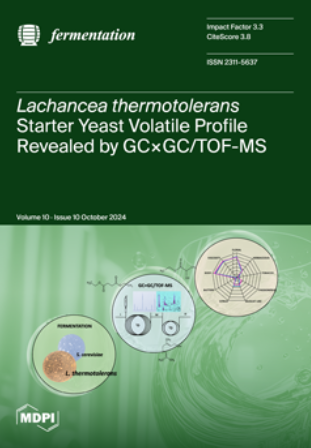Isolation and Characterization of Enterococcus faecium from Fermented Korean Soybean Paste with Antibacterial Effects
IF 3.3
3区 农林科学
Q2 BIOTECHNOLOGY & APPLIED MICROBIOLOGY
引用次数: 0
Abstract
In the present study, a total of eight Enterococcus faecium (OQ940301, OQ940302, OQ940303, OQ940304, OQ940305, OQ940308, OQ940309, and OQ940310) were isolated from soybean paste, a traditional Korean fermented food, and evaluated for their probiotic properties. The results showed that all the E. faecium strains survived in simulated human gastrointestinal conditions (4.1–5.59 log10 CFU/mL). In addition, the range of auto-aggregation was 5–25%, the hydrophobicity was around 94%, and it exhibited significant co-aggregation ability with Salmonella enterica and Staphylococcus aureus. However, all the isolates were shown to be resistant to Gentamycin. The bacterial cell-free supernatant showed antibacterial activity against S. enterica, Escherichia coli, Bacillus cereus, Listeria monocytogenes, and S. aureus. Furthermore, E. faecium exhibited potent anti-oxidant activity by scavenging 2,2′-Azino-bis(3-ethylbenzothiazoline-6-sulfonic acid) diammonium salt (ABTS) free radicals. In addition, safety was confirmed by evaluating the hemolytic activity in blood agar; none of the bacterial isolates showed hemolysis. These results demonstrated that E. faecium (OQ940301 and OQ940309) isolated from soybean paste showed a higher probiotic potential.发酵大豆酱中粪肠球菌的分离及抗菌性能研究
本研究从韩国传统发酵食品大酱中分离得到8株粪肠球菌(OQ940301、OQ940302、OQ940303、OQ940304、OQ940305、OQ940308、OQ940309和OQ940310),并对其益生菌特性进行了评价。结果表明,在模拟人胃肠道条件(4.1 ~ 5.59 log10 CFU/mL)下,所有粪肠杆菌菌株均存活。自聚集范围为5 ~ 25%,疏水性在94%左右,与肠炎沙门氏菌、金黄色葡萄球菌表现出显著的共聚集能力。然而,所有分离株均显示对庆大霉素耐药。细菌无细胞上清液对肠链球菌、大肠杆菌、蜡样芽孢杆菌、单核细胞增生李斯特菌和金黄色葡萄球菌均有抑菌活性。此外,粪肠杆菌还能清除2,2′-氮基-双(3-乙基苯并噻唑-6-磺酸)二铵盐(ABTS)自由基,显示出较强的抗氧化活性。此外,通过对血琼脂的溶血活性评价,证实了其安全性;所有细菌分离株均未出现溶血现象。结果表明,从大豆酱中分离得到的粪肠杆菌(OQ940301和OQ940309)具有较高的益生菌潜力。
本文章由计算机程序翻译,如有差异,请以英文原文为准。
求助全文
约1分钟内获得全文
求助全文
来源期刊

Fermentation-Basel
BIOTECHNOLOGY & APPLIED MICROBIOLOGY-
CiteScore
3.80
自引率
18.90%
发文量
594
审稿时长
7 weeks
期刊介绍:
Fermentation-Basel is an international open access journal published by MDPI, focusing on fermentation-related research, including new and emerging products, processes and technologies, such as biopharmaceuticals and biotech drugs. The journal enjoys a good reputation in the academic community and provides a high-impact forum for researchers in the field of bioengineering and applied microbiology.
 求助内容:
求助内容: 应助结果提醒方式:
应助结果提醒方式:


